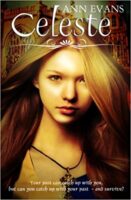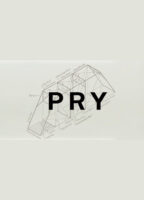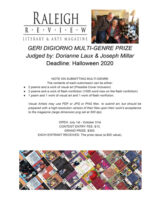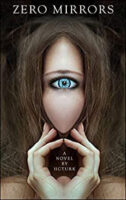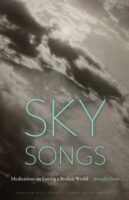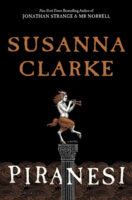Deadline: December 31, 2020
Please send your beauties and uglies to Club Plum for Volume 2, Issue 1, dropping January 15, 2021. Send your pain. Send your fury. Send your strange. Unsure if prose poem or flash fiction? Send it our way. See www.clubplumliteraryjournal.com for guidelines.
NewPages Blog
At the NewPages Blog readers and writers can catch up with their favorite literary and alternative magazines, independent and university presses, creative writing programs, and writing and literary events. Find new books, new issue announcements, contest winners, and so much more!
Contest :: Carve Magazine 2020 Prose & Poetry Contest
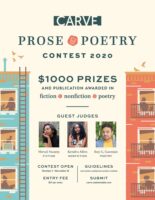 Deadline: November 15
Deadline: November 15
Carve Magazine‘s Prose & Poetry Contest is open October 1 – November 15. Accepting submissions from all over the world, but work must be in English. Max 10,000 words for fiction and nonfiction; 2,000 words for poetry. Prizes: $1,000 each for fiction, nonfiction, and poetry. All 3 winners published online in Spring 2021. Entry fee $17 online only. Guest judges are Shruti Swamy for fiction; Kendra Allen for nonfiction; and Roy G. Guzmán for poetry. www.carvezine.com/prose-poetry-contest/
Spread the word!
The Poetry of Plath
Sylvia Plath Poems Chosen by Carol Ann Duffy is a well put together ensemble of Plath’s deeply honest poetry. Her writings were vulnerable and held profound personal thoughts. Reading her poetry, I hear the voice of all women.
As Duffy mentions, Plath wrote confessional poems. She represented women and our challenges. Her voice is the voice we hear but quietly dare not express aloud, but still desperately feel and can never altogether ignore. I especially felt this from her poem “Mirror.” It is troubling and candid: “in me she has drowned a young girl, and in me/ an old woman/ rises . . . .”
She explores many motifs. At times, her poetry can be gripping and sad, but she also captures beautiful flashes and makes light of dark situations like in the poem “Last Words.” She has lines that make you smile because they are intelligently crafted even though the context is nothing to smile about, considering what we know about Plath’s life: “I should sugar and preserve my days like fruit!”
Sylvia Plath Poems Chosen by Carol Ann Duffy by Sylvia Plath. Faber & Faber, 2012.
Reviewer bio: Elda Pappadà recently self-published her first poetry book, Freedom—about love, loss, and understanding. A book about defining life and giving weight to everything we do. Twitter: @poems_elda.
Spread the word!
Call :: Chestnut Review – Home to Stubborn Writers
Chestnut Review (“for stubborn artists”) invites submissions year round of poetry, fiction, nonfiction, art, and photography. We offer free submissions for poetry (3 poems), flash fiction (<1000 words), and art/photography (20 images); $5 submissions for fiction/nonfiction (<5k words), or 4-6 poems. Published artists receive $100 and a copy of the annual anthology of four issues (released each summer). Notification in <30 days or submission fee refunded. We appreciate stories in every genre we publish. All issues free online which illustrates what we have liked, but we are always ready to be surprised by the new! Now reading for the Spring 2021 issue due out in April. chestnutreview.com
Spread the word!
Contest :: Acacia Fiction Prize! $1,200 & Publication
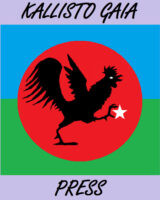 Deadline: December 31, 2020
Deadline: December 31, 2020
The Acacia Fiction Prize winner is awarded $1,200, twenty author copies, plus publication and promotion by Kallisto Gaia Press for a collection of Short Stories, Flash Fiction, Novellas, or any combination of fiction totaling between 40K and 75K words. Richard Z. Santos (Trust Me, 2020) will judge. Runner up receives $100. Entry fee is $25. All entrants receive a copy of the winning collection! Deadline: December 31, 2020. Sponsored by Duotrope. More info at kallistogaiapress.submittable.com/submit.
Spread the word!
Contest :: Zizzle Literary Flash Contest Judged by David Galef & Karen Heuler
Deadline: March 15, 2021
First Prize: $1,000. Second Prize: $500. Three finalists: $150 each. Entry Fee: $5 only. Do you write stories that appeal to both kids and adults? Every week during our submission period, we’ll post one-sentence dialogue writing prompts on our social media platforms. Choose a dialogue prompt that inspires you and write a story that includes the prompt. SUBMISSION GUIDELINES: zizzlelit.com/contest/. SUBSCRIBE TO OUR NEWSLETTER at zizzlelit.com/sign-up/ for updates and free audio editions.
Spread the word!
An A+ YA Novel
Celeste by Ann Evans is a real page-turner! The main character, Megan Miller, is a teen and is facing sensations of Deja vu. Along with her are two more side characters who play a really important role in the novel.
The story is written in between time-slips, which many authors fail to manage. But Ann Evans has successfully completed and managed the time-slip writing very well!
This is the first book I‘ve read from this author and I’ll certainly be reading more. The story is exciting and scary, breath-taking in many places as it moves seamlessly between present day and a time in the distant past. The characters are all believable. I particularly liked Jamie. He’s very friendly and helpful. Megan at first, suspects him of—sorry, not going to tell you that; no spoilers!—but eventually their friendship blooms. The writing style is also very clear and I can vote it as an A+. The author’s narrative blends well, and the story is all believable and seems true.
What I would like Evans to improve is the story length. The book is a quick read, and I would have really loved it if the story would have lasted a while longer. Maybe the author could have added scenes about Megan’s prior residence, her description, her sister Ruth’s description, the new residence and school’s description, and a few more scenes. But I highly recommend Celeste to all the readers who are looking out to read in this genre.
Celeste by Ann Evans. Createspace, June 2014.
Reviewer bio: Manasi Patil is a young author with a passion for writing.
Spread the word!
Pry into a New Experience
The more you look, the more you learn. Samantha Gorman and Danny Cannizzaro have created an out of the ordinary eBook experience, an app novella, that dives into the overlapping thoughts of James, a demolition consultant who struggles with his vision and his memories of the Gulf War. Pry isn’t just a story you read off a screen, but one you interact with.
Pry has a branching narrative, similar to game writing, which can feel overwhelming at first because it is a new way of interactively reading. The words keep opening and connecting deeper thoughts, enhancing the story. The reader becomes James, not just by reading his thoughts, but by seeing the world around him. The reader pinches and pulls on the screen, revealing the vast layers of images, videos, and text all filtered through James’ mind.
James’ suffering past, and his lack of communication with his best friend, Luke, causes feelings of discomfort. James is disconnected from his current life and distances himself from Luke, even though they presently work together. All he sees is the squad leader version of Luke. During the war, James had feelings for Jessie, another member of their squad, who was secretly involved with Luke. James added photos of Jessie to an album that held memories of his late mother. The album was supposed to be his way to leave thoughts of war and remind himself of human connection; but instead, it became a fire of regrets and the catalyst that led to Jessie’s death.
It would be interesting to change narrators and experience Luke’s perspective. The creativity behind Pry provides a unique and memorable experience. Look deeper and your eyes will catch something else that will pry open that desire for human connection and to keep those we love close.
Pry by Danny Cannizzaro & Samantha Gorman. Tender Claws, October 2014.
Reviewer bio: Laurie Jackson is a writer and artist who is currently working on her first YA series. She started combining her artwork with her creative writing in the imagine section of her blog #words2art.
Spread the word!
Call :: Oyster River Pages Special Black Voices Issue
Deadline: December 1, 2020
Art is a fundamental aspect of being human—not exclusive to any group of people, place, or privilege. However, current events have highlighted the extent to which Black voices have been silenced in numerous sectors of public life and creative fields. In this issue, we want to highlight Black artists exclusively, and be a platform for Black voices, unfiltered and unrestrained by parameters of theme. This is not a call to confess your struggles, your fight, or to defend your identity. This is a call for the art that sits within you. For the ink that bleeds your pages. www.oysterriverpages.com
Spread the word!
The End of the Ocean
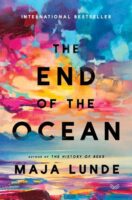 Guest Post by Kristín M Hreinsdóttir
Guest Post by Kristín M Hreinsdóttir
The End of the Ocean is a novel by Maja Lunde who is a Norwegian author. I started to read this book because it was due to be the next book to read in my book club. When I started reading, I was not sure what I was going to find. I had not at that point read something written by Maja Lunde and was not sure I was going to like it—before my reading, I was told it was about some environmental tragedy and also set in the future. Maybe it is my inner fear or some underlying knowledge about a tragedy like that which makes me dislike the subject, as well as my long-lasting dislike for books or stories set in the future. Why don’t I like stories like that? It is because I think it can be so often overdramatic and superficial and not real. Maja Lunde does the opposite and did hold my attention from beginning to almost the end.
Yes, it is about an environmental tragedy in the future, but it can also be in our time when the water is beginning to be the most important thing, though most of us are not willing to accept that. The novel is also about how the individual handles crises and difficult times, and is a protest against our greedy action against nature. Greed is something we have seriously to think about.
I liked how the book is written but sometimes it lacked flow, but it did not spoil the story so much. The characters are interesting and so well set up that you start to have some strong opinion on them, growing to like or dislike them very much. The weakest part of the story is the end; it almost ended so suddenly that the reader gets the feeling that there is something missing. You are left wanting to know what happens next. But that is maybe a plus that you start to wonder about the end and make your own.
The End of the Ocean by Maja Lunde. HarperVia, January 2020.
Reviewer bio: My name is Kristín M Hreinsdóttir. I live in Iceland and have always like books and literature. I hold B.Ed. in information technology and media and an MA in museum study.
Buy this book from our affiliate Bookshop.org.
Spread the word!
Program :: University of South Alabama MA with Creative Writing Emphasis
Earn your MA with an emphasis in Creative Writing in the vibrant city of Mobile, near some of our country’s best beaches. Tuition waivers and assistantships are available as are additional scholarships for excellence and summer creative writing projects. Home of the Stokes Center for Creative Writing. For more information, visit our website: www.southalabama.edu/colleges/artsandsci/english/.
Spread the word!
River Teeth Launches Weekly Online Magazine of Micro-Essays
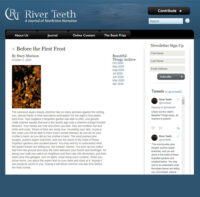
In April 2020, biannual print literary magazine River Teeth launched the online weekly journal Beautiful Things. This publication is devoted to very brief nonfiction that finds beauty in the everyday. Readers can subscribe to receive the latest micro-essay in their inbox every Monday morning. Today’s essay is “Before the First Frost” by Stacy Murison.
Beautiful Things was inspired by Michelle Webster-Hein’s essay “Beautiful Things” which was originally published in Volume 15, Number 1 of River Teeth. This column is co-edited by Michelle Webster-Hein and Jill Christman.
River Teeth is devoted to publishing the best creative nonfiction, including narrative reportage, essays, and memoir. Stop by their listing on NewPages to learn more about them and their new online publication.
Spread the word!
Zombie Parallels
The whole Covid-19 pandemic got me into reading World War Z by Max Brooks. Published in 2007, the novel follows characters around the world as they struggle to survive a zombie outbreak that overtakes the globe. It takes place before, during, and after the zombie outbreak.
The narrator interviews a new survivor from a different part of the world for each chapter. Some chapters can be two pages long, while others can be twenty pages depending on what is being covered. From clearing the catacombs beneath Paris to managing satellites in space, the novel describes interesting scenarios that I would have never thought of when dealing with the undead.
All this being said, it does have a fair share of gore, which is expected in the zombie genre. So it is not for the faint of heart. What really drew me into picking up World War Z were the parallels people online were pointing out between the book and what has happened with the coronavirus. In the novel, the zombie outbreak starts in China and the government there tries to cover it up but it spreads. The United States is overconfident in its ability to contain the threat and promotes a fake drug, Phalanx, which supposedly cures the new disease. I could go on, but I don’t want to spoil too much.
I bought both the book itself and the audiobook. I follow along as it is being read, because that is how I absorb the information best due to my dyslexia. Even the audiobook has a different voice actor for each chapter. There were even some voices I recognized such as Nathan Fillion, Mark Hamill, Simon Pegg, and Martin Scorsese. However, I noticed the audiobook did have a few paragraphs and chapters missing in the beginning but that didn’t bother me that much.
World War Z by Max Brooks. Penguin Random House, October 2007.
Reviewer bio: I grew up in South Carolina but have lived in Switzerland. My traveling experiences have sparked my creativity and inspired me to write.
Buy this book at our affiliate Bookshop.org.
Spread the word!
World Literature Today – Fall 2020
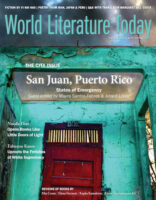
San Juan, Puerto Rico, takes the spotlight in World Literature Today’s annual city issue with a powerful selection of poetry, stories, and essays by 17 writers. Other highlights in the autumn issue include Fabienne Kanor’s essay on uprooting the fetishes of white supremacy; interviews with Natalie Diaz and Margaret Jull Costa; a stunning poem by Achy Obejas on “the universe at absolute zero”; fiction by Vi Khi Nao and Lidija Dimkovska; and much more. Reviews of new books by Elena Ferrante, Mia Couto, Kapka Kassabova, and dozens more make WLT your go-to guide for the best in international literature
Spread the word!
Understorey Magazine – Issue 18

Understorey Magazine Issue 18 is out. Read for examinations on the many ways science and technology affect our everyday lives. Poetry by Moni Brar, Daze Jefferies, Kimberley Orton, Dawn Macdonald, Kayleigh Cline, and I. Sabrina Samreen; fiction by Gail Willis; and nonfiction by Jeanne Kwong, Sima Chowdhury, Stacey McLeod, and Rita Kindl Myers. Plus, interviews with Maryam Heba and Chelsey Purdy.
Spread the word!
THEMA – Fall 2020
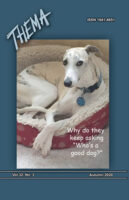
The writers in the Autumn 2020 issue of THEMA all explore the theme: What a Strange Question! Stories, short-shorts, poems, and photographs by Andrew M. Seddon, Virginia McGee Butler, Linda Berry, Beverly Boyd, Lynda Fox, J. Jackson, John Hill, Dick Moody, and more.
Spread the word!
Plume – October 2020
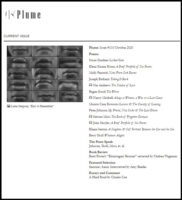
This month’s Plume featured selection includes an interview with francine j harris by Amy Beeder, as well as works by the poet. Charles Coe writes “A Hard Road” in the essays and comment section, and Chelsea Wagenaar reviews Brett Foster’s Extravagant Rescues.
Spread the word!
The Georgia Review – Fall 2020
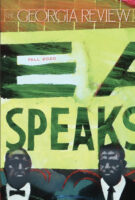
The Georgia Review’s Fall 2020 issue is out with new work from Kaitlyn Greenidge, Wayne Koestenbaum, Sally Wen Mao, Charles Baxter, Marianne Boruch, Yona Harvey, and many other compelling voices, both emerging and long-established. Special features include a portfolio of artwork from the High Museum of Art’s exhibition Picture the Dream: The Story of the Civil Rights Movement Through Children’s Books and a translation of Vinod Kumar Shukla’s masterful short story “College.”
Spread the word!
Cleaver Magazine – Oct 2020

In this issue of Cleaver, find three collaborations: “Reparations Wine Label” with text and concept by J’nai Gaither and art by Phoebe Funderburg-Moore; “The Esperanza Project” with music by Richard Casimir, video editing by Michael Casimir, and a poem by Herman Beavers; and “Terra in Flux” with poetry by Mark Danowsky and photography by John Singletary.
Spread the word!
Call :: Leaping Clear Editorial Opening
Leaping Clear, www.leapingclear.org, is looking for an editor to join the volunteer editorial team. We’re all practicing artists with dedicated meditative/contemplative practices and welcome someone who shares these activities. Social media experience and good communication skills are essential. For details on stipend and work specifics, please contact [email protected], with Editor, NewPages in subject line.
Spread the word!
Cimarron Review – Issue 211
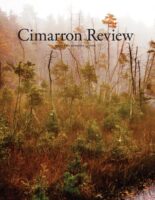
Issue 211 of Cimarron Review features poetry by Bonnie Auslander, Clemonce Heard, Leslie McGrath, Emily Franklin, Chris Haven, Matt Morgan, Laura McKee, Bryce Berkowitz, Elisabeth Murawski, Jan Beatty, Kayla Sargeson, and others; fiction by Andrew Geyer, Molly Anders, and Steven Wingate; and nonfiction by Ephraim Scott Sommers and Caroline Sutton. This issue’s cover art is “River Fog” by Richard Speedy.
Spread the word!
Brilliant Flash Fiction – Sept 2020
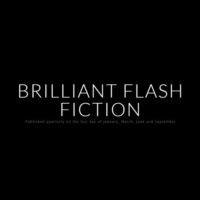
In the September 2020 issue of Brilliant Flash Fiction, find new flash by Madalyn Aslan, Bernard Arogyaswamy, Lisa Fox, Alan Ford, Sudha Balagopal, and more. Find out more at the Brilliant Flash Fiction website.
Spread the word!
The Baltimore Review – 2020
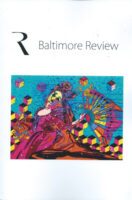
This year’s print collection of The Baltimore Review is now out. It includes poems, stories, and creative nonfiction published in The Baltimore Review‘s Summer 2019 Maryland Writers Special Issue, Fall 2019, Winter 2020, and Spring 2020 online issues. Work by Sandy Longhorn, Tim Griffith, Maggie Andersen, Jennifer Lang, Kathleen Hellen, Kris Faatz, Michael Downs, Grace Cavalieri, Stephen Tuttle, Libby Heily, Emily Stoddard, Diana Xin, Omer Friedlander, Jeannine Hall Gailey, Avra Margariti, Naomi Cohn, and many more.
Spread the word!
Event :: Driftwood Press Virtual Seminars for Fiction & Poetry
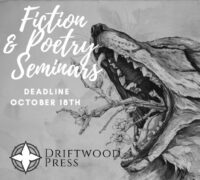 Driftwood Press‘ “Editors & Writers: The Path to Publication” and “Chapbook Creation” seminars are open for registration! Short story writers and poetry chapbook writers seeking to polish their craft and learn about the other side of submissions should apply; each course includes five lectures, critiques, prompts, readings, and more. Both courses are limited to fifteen spots each and will close when those spots are filled or when the course begins on October 19th. Click the link for more testimonials, a lecture list, and additional information.
Driftwood Press‘ “Editors & Writers: The Path to Publication” and “Chapbook Creation” seminars are open for registration! Short story writers and poetry chapbook writers seeking to polish their craft and learn about the other side of submissions should apply; each course includes five lectures, critiques, prompts, readings, and more. Both courses are limited to fifteen spots each and will close when those spots are filled or when the course begins on October 19th. Click the link for more testimonials, a lecture list, and additional information.
Spread the word!
EVENT Virtual Fall Reading Series
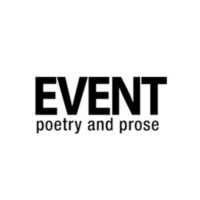 Have you been keeping up with EVENT Magazine‘s Fall Reading Series? Each week, they’re introducing one writer, along with a video of each author reading their work from the safety of their homes. So far, they’ve featured John Elizabeth Stintzi, Rose Cullis, and Jane Eaton Hamilton.
Have you been keeping up with EVENT Magazine‘s Fall Reading Series? Each week, they’re introducing one writer, along with a video of each author reading their work from the safety of their homes. So far, they’ve featured John Elizabeth Stintzi, Rose Cullis, and Jane Eaton Hamilton.
Stay safe at your own home and check out the videos on EVENT‘s YouTube channel, or via their blog. A great activity for these rainy, cool fall days we now find ourselves in.
Spread the word!
Hippocampus: Devoted to Memorable Creative Nonfiction
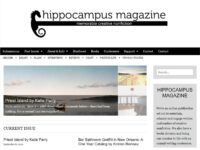 Launched in 2011, online literary magazine Hippocampus was first dreamed about by founder and editor Donna Talarico when she was working on her MFA in creative writing at Wilkes University. Talarico wanted to create not just a literary magazine, but also develop a venue to education and inform those interested in reading and writing creative nonfiction.
Launched in 2011, online literary magazine Hippocampus was first dreamed about by founder and editor Donna Talarico when she was working on her MFA in creative writing at Wilkes University. Talarico wanted to create not just a literary magazine, but also develop a venue to education and inform those interested in reading and writing creative nonfiction.
Their sea horse logo was created since the hippocampus, the part of the brain dealing with memories, is sea-horse-shaped.
Over the years, they have launched a nonfiction writing contest, an annual nonfiction writing conference, and now a book publishing division. They are open to submissions annually from March through December.
Their September 2020 issue features work by Katie Parry, Kirsten Reneau, Rachel Fleishman, Brad Wetherell, Daniel K. Miller, Gwen Niekamp, and more.
Learn more about this magazine by stopping by their listing on NewPages.
Spread the word!
Find Nature with Humana Obscura
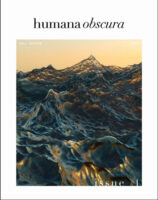
Online and print literary magazine Humana Obscura publishes the best new, emerging, and established writers and artists in the “nature space.” As their name applies (obscured human), they focus on works where the human elements is concealed, but not entirely absent, aiming to revive the genre of nature-centric poetry and art.
They publish two issues a year featuring poetry, short prose under 1,000 words, and artwork in various mediums. Their inaugural issue features poetry by James King, Emily Hermann, Danielle Zipkin, David Baker, Mary Buchinger, and more; prose by Kathleen Deep, Nick O’Brien, Maggie Maize; and Angela Shen; with art by Margaret Dries, Kyra Schmidt, J. T. Bruce, and more.
They are currently open to submissions for their second issue. Learn more here. Don’t forget to stop by NewPages to discover more about this fledgling literary magazine.
Spread the word!
Call :: Archer Publishing Seeks Sports-themed Poetry for Young Adult Anthology
Deadline: November 1, 2020
We have so many wonderful sports-themed young adult novels and short stories, but our industry is missing a collection of contemporary poetry for our student-athletes that represents their lives in this current climate. Archer Publishing seeks identity-inclusive/affirming poems for this anthology addressing contemporary sports-themed topics that are of high interest to high school students and relevant to their lives. Editor: Sarah J. Donovan, Oklahoma State University. Email submissions to [email protected]. Submission deadline is November 1, 2020 with decisions made by January 1, 2021. Anticipated publication date is December 2021 or January 2022. See the website for more information about the project.
Spread the word!
Diversity of Little Libraries Lies in their Non-curated Nature
Is making the shelves of Little Free Libraries more diverse an appropriate role for their stewards? Emblems of diversity already, these little book nooks give pleasure by not being “stewarded” at all. Ideally, you never know what you might find in one. You don’t have the feeling that someone has pre-engineered your discovery. Continue reading “Diversity of Little Libraries Lies in their Non-curated Nature”
Spread the word!
Contest :: Baltimore Review Winter 2020 Contest: 1,000 Words or Less
Deadline: November 30, 2020
No theme for our winter contest. Subject matter is entirely up to you. Surprise us! But keep it short. Two categories: flash fiction and flash creative nonfiction. We want to be amazed at how you abracadabra 1,000 or less into magic. And maybe be a little jealous of how you do that. One writer in each category will be awarded a $300 prize and published in the winter issue. All entries considered for publication and payment. Final judge: Diana Spechler. See www.baltimorereview.org for complete details. Deadline: November 30, 2020. Fee: $5.
Spread the word!
Contest :: Geri DiGiorno Prize judged by Laux/Millar & Flash Fiction Prize
Deadline: Midnight on Halloween 2020
Raleigh Review is currently offering two contests. The RR Flash Fiction Prize is being judged by our esteemed Fiction team ($300 Grand Prize, $13 entry fee). Raleigh Review is also offering the Geri DiGiorno Multi-Genre Prize with Dorianne Laux & Joseph Millar as the judges of the finalists. Think of our DiGiorno Prize as a collage prize that includes at least two of the genres among poetry and/or visual art and/or flash nonfiction ($300 Grand Prize, $13 entry fee). Submissions close by midnight on Halloween. All entrants shall receive the prize print issue for free.
Spread the word!
Call :: Beliefs, Myths, and Narratives in Southern Culture
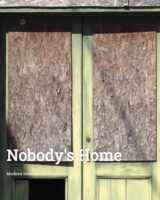 Deadline: December 15, 2020
Deadline: December 15, 2020
Founded in 2020, Nobody’s Home: Modern Southern Folklore is an online anthology of creative nonfiction works about the prevailing beliefs, myths, and narratives that have driven Southern culture over the last fifty years, in the late 20th and early 21st centuries. The publication collects personal essays, memoirs, short articles, opinion pieces, and contemplative works about the ideas, experiences, and assumptions that have shaped life below the old Mason-Dixon Line since 1970.
Spread the word!
A Wild Light
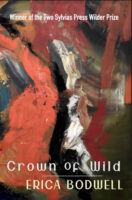 Guest Post by Susan Kay Anderson
Guest Post by Susan Kay Anderson
Bodwell’s Crown of Wild, with its gorgeous cover of an abstract painting (by the poet’s late father), is an exciting reminder of our own moments of wild abandon and others’ wild abandon gone right/gone wrong. In “Summertime” we get to read a list of pleasurable freedoms: “. . . swim the length of every pool . . . / . . . French kissing Matt Matera . . . .” later becoming abandoned to the larger universe as this poem closes. What are the answers, this poem seems to be asking. Can anything be held and kept, or is even capturing memories an act of abandon as this very idea is also in survival mode?
I’ve been reading these poems with the cover in my mind. Its brushstrokes seem to be a visual companion to the pain of grief and anxiety of what now overwhelms: forest fires, death and abuse, a madman at the helm.
What does abstract art do but tell a story in a different way, a way that leads to musings and fresh starts? There are no easy answers.
In “Where Rivers And Mountains Remain,” one of the poems in Crown Of Wild paying homage to Kayla Mueller, the captured American woman who was held and died in Syria, we see wishes for Mueller: ” . . . silvery dreams” and ” . . . a crown woven from stars” as gentle acknowledgements and gifts of praise.
What Bodwell constructs in Crown Of Wild are sculptures and sketches and shapes so each poem can express what was unthinkable. Where will the brush go? What color will it pick up as it merges and is dragged through what is already there? What is soothed? Stirred?
These poems do not need explanation, they seem to be saying. They stand alone on their base, on that which protects and extends and illustrates what is “wild” to what is really wild and beyond our imagining. They say here is beauty and the redemption that moonlit/starlit rivers and mountains bring because they remain after all that has happened, is happening.
Crown Of Wild by Erica Bodwell. Two Sylvias Press, 2020.
Reviewer bio: Susan Kay Anderson has work forthcoming from Loud Coffee Press, Sleet Magazine, and Finishing Line Press.
Buy this book from our affiliate Bookshop.org.
Spread the word!
Contest :: The Philadelphia Stories/Sandy Crimmins National Prize for Poetry
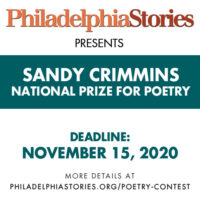 The Sandy Crimmins National Prize for Poetry is an annual national poetry prize featuring a $1,000 cash award for first place. Three runners up will each receive a $250 cash award. The winning and runner up poems are published in the Spring issue with these poems and honorable mentions also appearing online. The Crimmins Prize celebrates risk, innovation, and emotional engagement. We especially encourage poets from underrepresented groups and backgrounds to send their work. Deadline: November 15, 2020.
The Sandy Crimmins National Prize for Poetry is an annual national poetry prize featuring a $1,000 cash award for first place. Three runners up will each receive a $250 cash award. The winning and runner up poems are published in the Spring issue with these poems and honorable mentions also appearing online. The Crimmins Prize celebrates risk, innovation, and emotional engagement. We especially encourage poets from underrepresented groups and backgrounds to send their work. Deadline: November 15, 2020.
Spread the word!
New Lit on the Block :: Binsey Poplar Press
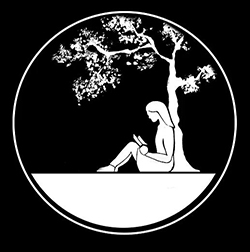 “Having a safe space to share your art/writing and the power of publication to galvanize aspiring young artists and writers to share their voice” is a motivating factor behind Binsey Poplar Press according to Founder and Editor Sophia Smith. Featuring poetry, fiction, nonfiction, photography, and art by contributors ages 13-26, Binsey Poplar Press publishes an online literary magazine every two months as well as publishing pieces on their website. “Our website will be continuously updated with new art and writing pieces and issues,” said Jessica Gao, Web Designer and Co-Editor for Art. “We hope to make it even more visually appealing and be one of your favorite reading spots.” Continue reading “New Lit on the Block :: Binsey Poplar Press”
“Having a safe space to share your art/writing and the power of publication to galvanize aspiring young artists and writers to share their voice” is a motivating factor behind Binsey Poplar Press according to Founder and Editor Sophia Smith. Featuring poetry, fiction, nonfiction, photography, and art by contributors ages 13-26, Binsey Poplar Press publishes an online literary magazine every two months as well as publishing pieces on their website. “Our website will be continuously updated with new art and writing pieces and issues,” said Jessica Gao, Web Designer and Co-Editor for Art. “We hope to make it even more visually appealing and be one of your favorite reading spots.” Continue reading “New Lit on the Block :: Binsey Poplar Press”
Spread the word!
Abandon Mediocrity with Zero Mirrors
In my several decades of reading, I have never encountered the likes of Zero Mirrors.
The narrator is a sentient dress worn by the main character, a woman living in a city of boredom. Her companion is a kidult: an adult who had his body modified so he’s the size of a child, because that’s the only time of his life when he was truly happy. The dress is a WAD (Wearable Assistive Data-integrator) worn by Melony, who is a Sashayer in EasyLiving City (not a dancer, because dancing is illegal). Her dearest friend is Robben, the original pilot of the Tree, the area’s greatest building and a grounded spaceship.
Abetted by her companions, Melony’s goal is to sashay through time to save her land from a Plant Plague arriving from the future. Along with being thoughtful and hilarious, this time travel story deals with gender identity, ageism, and family leadership. A key theme is the nature of human movement, from dancing to fleeing to slipping through time.
I’m not going to delineate the story except to say it has three endings: past, present, and future. I’m not able to tell you how often I had to stop reading because the book was making my brain rattle from astonishment or my stomach churn from hilarity or my eyes tear from a poignancy beyond the reality we’re stuck with. A word I hate to see in the description of any artwork is “visionary,” but the word is appropriate here. H. C. Turk has a vision of the future that makes our present seem insubstantial and ignorant, a timeframe that should be left behind. With this book, the reader can abandon that mediocrity for an enthralling experience beyond the norm, exactly equal to the book’s unique, stylish energy.
“You can’t imagine how heartsick you can be when you don’t have a heart.”
Zero Mirrors by H. C. Turk. September 2020.
Reviewer bio: Recently retired from the construction industry, Gerty Haas is an avid reader and art lover living in Florida, which thankfully is not part of The South.
Spread the word!
Sponsor Spotlight :: EVENT: The Douglas College Review
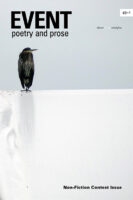 Founded in 1971, EVENT is a literary magazine dedicated to nurturing writers and presenting readers with the best contemporary writing from Canada and abroad. They strive to publish a diversity of voices and literary styles and have published many distinguished writers before and after they gained national or international recognition, i.e. André Alexis, George Bowering, Charles Bukowski, Esi Edugyan, Jack Hodgins, Annabel Lyon, Pablo Neruda, Alden Nowlan, Nino Ricci, Diane Schoemperlen, Carol Shields, Timothy Taylor, and Madeline Thien.
Founded in 1971, EVENT is a literary magazine dedicated to nurturing writers and presenting readers with the best contemporary writing from Canada and abroad. They strive to publish a diversity of voices and literary styles and have published many distinguished writers before and after they gained national or international recognition, i.e. André Alexis, George Bowering, Charles Bukowski, Esi Edugyan, Jack Hodgins, Annabel Lyon, Pablo Neruda, Alden Nowlan, Nino Ricci, Diane Schoemperlen, Carol Shields, Timothy Taylor, and Madeline Thien.
Each year they host a Non-Fiction Contest. The contest awards $3,000 in prizes ($1,500 First Place, $1,000 Second Place, $500 Third Place) plus publication in the Spring/Summer issue. This is the longest-running contest of its kind in Canada. The deadline to enter is October 15 annually. Check out Issue 49/1 to view the winning pieces of their 2019 contest: “Judge’s Essay” by Anthony Oliveira, “The Dead Green Man” by Jane Eaton Hamilton, “Things You Think When Your Husband Has a Heart Attack” by Mary Steer, and “My Beautiful Madness” by Rose Cullis.
Besides publishing issues three times a year, EVENT also offers a reading service for writers. Stop by their listing on NewPages to learn more.
Spread the word!
Call :: Jelly Bucket Call for Black Lives Matter Submissions
Deadline: December 15, 2020
For its 11th print issue, Jelly Bucket will feature a special section—guest-edited by 2009 National Book Award Finalist, Lyrae Van Clief-Stefanon—dedicated to the Black Lives Matter movement. Send us poetry, prose, or text-as-art that captures, explores, reflects, reports, ruminates upon, or dialogues with social justice as it relates to the African American experience and BLM. Work from Jelly Bucket has appeared in the Best American anthology series and is annually nominated for the Pushcart Prize anthology. Online submissions only, $2 fee: jellybucket.submittable.com/submit.
Spread the word!
Contest :: Scholarship Program for High School Seniors Targeting the Ivy Leagues
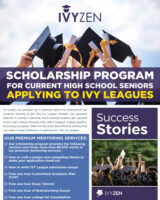 Application Deadline: November 15, 2020
Application Deadline: November 15, 2020
At IvyZen, our greatest joy is helping realize the potential of top students looking to get into Ivy League Schools. The scholarship program provides the following services and totals more than $8,000 worth of our premium mentoring services: How to craft a unique and compelling theme to make your application stand out; Overall application strategy and plan; How to write Ivy League admissions essays; Brainstorming Essays; College List Consultation; Free access to our project management platform to keep all your essays and materials organized; and 24/7 online access to the IvyZen Mentorship Team.
Spread the word!
The LaHave Review Spotlighting Poems & Poets
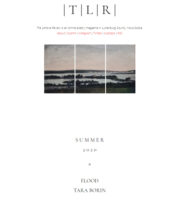 Founded in 2019, online quarterly literary magazine The LaHave Review highlights a single poem in each issue with an interview and notes about the poem. The Fall 2020 issue features “As For the Glossy Green Tractor Your Were” by Allison Adair. Past issues include “Flood” by Tara Borin (Summer 2020), “Buttercup” by Emily Tristan Jones (Spring 2020), and “What I Can’t Tell Her” by Ashley Anna McHugh (Winter 2020).
Founded in 2019, online quarterly literary magazine The LaHave Review highlights a single poem in each issue with an interview and notes about the poem. The Fall 2020 issue features “As For the Glossy Green Tractor Your Were” by Allison Adair. Past issues include “Flood” by Tara Borin (Summer 2020), “Buttercup” by Emily Tristan Jones (Spring 2020), and “What I Can’t Tell Her” by Ashley Anna McHugh (Winter 2020).
They read poetry submissions year-round and pay $100 CAD per poem for first publication rights.
The journal is named after the LaHave River in Lunenburg County, Nova Scotia where the magazine is based and is edited by Michael Goodfellow. Stop by their listing on NewPages to learn more.
Spread the word!
Lyrical Examinations
Like other readers, I had grand plans when the world went on lockdown. I would begin with War and Peace. I went as far as borrowing the book from a friend, left it on my shelf unopened, and instead turned to newly published nonfiction that grappled with the question of what it is to live a good life. The most recent addition to this stack of books is Jennifer Sinor’s Sky Songs. (Disclosure: Sinor and I teach at the same university.)
Both the title and cover image of Sinor’s essay collection are drawn from Alfred Stieglitz’s photographic study Songs of the Sky (later titled Equivalents), nearly four hundred abstract images captured when Stieglitz turned his camera to the clouds. “What is of greatest importance,” Stieglitz said, “is to hold a moment, to record something so completely that those who see it will relive an equivalent of what has been expressed.”
It was an emotional equivalence Stieglitz sought, and the same could be said of Sinor’s fifteen essays. Sky Songs meditates on the defining moments of a life—the tragic death of an uncle, a dissolving marriage, new love, the birth of a child, an encounter with wildlife, the loss of one religion and, years later, the unfolding of another. Read on their own, each essay offers a patient, lyrical examination of these moments. Together, the essays offer a profound reading experience, enriched by a layering of images, a deep sense of place, and the inescapable truth that although we are often haunted by our earliest tragedies, we are equally shaped by the beauty we find in the world around us. Ultimately, Sky Songs delivers what it promises, and what it promises is no small thing: the emotional equivalence of a life well lived.
Sky Songs: Meditations on Loving a Broken World by Jennifer Sinor. University of Nebraska Press, October 2020.
Reviewer bio: Amber Caron’s fiction and non-fiction can be found in The Threepenny Review, PEN America Best Debut Short Stories, Southwest Review, Longreads, and elsewhere.
Buy this book from our affiliate Bookshop.org.
Spread the word!
Contest :: Second-Ever #SWWIMEveryDay Competition
Deadline: October 26, 2020
Announcing the second-ever #SWWIMEveryDay competition: SWWIM For-the-Fun-of-It! Deadline: October 26. $5 per poem. First prize: $250 + letterpress broadside + publication; Second prize: $100 + publication; Third prize $50 + publication. Submit up to 10 times. The incomparable Ashley M. Jones is judging! Full guidelines at www.swwim.org/contest-swwim-forthefunofit.
Spread the word!
Call :: International Submissions Call – Inspirational Art, Flash Fiction, Photography, Short Stories
Launched in 2019, Auroras & Blossoms is dedicated to promoting positive, uplifting, and inspirational art; and giving artists of all levels a platform where they can showcase their work and build their publishing credits. We publish short stories, six-word stories, paintings, and drawings. We are also looking for work that tells beautiful stories and articles that are helpful to photographers at every level of their career for publication in our sister journal FPoint Collective Photography Magazine. We are interested in photography, along with articles, tips, stories, and essays relating to photography. International submissions welcome. Submission Guidelines and apply here. Submissions are accepted year-round.
Spread the word!
Contest :: F(r)iction Fall 2020 Writing Contests
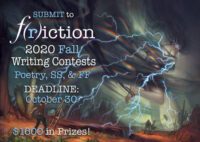 Deadline: October 30, 2020
Deadline: October 30, 2020
F(r)iction’s Fall 2020 Writing Contests are now open! We are accepting short stories, flash fiction, and poetry and will be awarding $1,600 in prizes. Entries will be judged by our amazing guest judges Lev Grossman, Benjamin Woodard, and Rachel Mennies. The winner in each category will receive free edits from one of our stellar senior editors as well as publication of their piece either online or in our print journal. For more information and to submit your work, please go to frictionlit.org/contests.
Spread the word!
This is Love
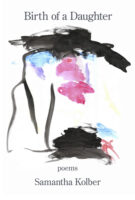 Guest Post by Courtney B. Jenkins
Guest Post by Courtney B. Jenkins
As I read Samantha Kolber’s poetry debut, I thought of all the mothers I know and hold dear—close friends, my sister, my own mother; I want to give them this book, share with them this gift of understanding.
I paused as I read to absorb moments of “Whoa,” as Kolber’s words reveal what it meant to her to become Mother. I re-read to assimilate every nuance before passing on to the next vignette. Each feeling evoked felt important. Kolber’s words are powerful draws into her world and, somehow, although I am not a mother—a birth-mother, anyhow—I know these feelings. I suddenly understand the patience I see in the mothers around me—browbeaten and screamed at by tiny versions of themselves—who are somehow able to smile in response and reply with patience and logic to the demands of their offspring. And, I realize, through this breadth of written, recorded emotion: this is love. My eyes teared with the fullness of it. And although I have no literal means of comparison in my own life, I understand. Continue reading “This is Love”
Spread the word!
Call :: Don’t forget Driftwood Press Pays Contributors
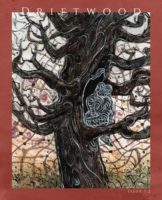 John Updike once said, “Creativity is merely a plus name for regular activity. Any activity becomes creative when the doer cares about doing it right, or better.” At Driftwood Press, they actively search for artists who care about doing it right, or better. They are excited to receive your submissions and will diligently work to bring you the best in full poetry collections, novellas, graphic novels, short fiction, poetry, graphic narrative, photography, art, interviews, and contests. They also offer their submitters a premium option to receive an acceptance or rejection letter within one week of submission; many authors are offered editorships and interviews. To polish your fiction, note they have editing services and seminars, too. Read Issue 7.2 featuring Jessica Holbert, Seth Brady Tucker, Janiru Liyanage, Katherine Fallon, Yi-Hui Huang, and more, for a taste of what they like. Submissions accepted year-round.
John Updike once said, “Creativity is merely a plus name for regular activity. Any activity becomes creative when the doer cares about doing it right, or better.” At Driftwood Press, they actively search for artists who care about doing it right, or better. They are excited to receive your submissions and will diligently work to bring you the best in full poetry collections, novellas, graphic novels, short fiction, poetry, graphic narrative, photography, art, interviews, and contests. They also offer their submitters a premium option to receive an acceptance or rejection letter within one week of submission; many authors are offered editorships and interviews. To polish your fiction, note they have editing services and seminars, too. Read Issue 7.2 featuring Jessica Holbert, Seth Brady Tucker, Janiru Liyanage, Katherine Fallon, Yi-Hui Huang, and more, for a taste of what they like. Submissions accepted year-round.
Spread the word!
Contest :: RHINO Founders’ Prize Deadline is October 15
 Deadline: October 15, 2020
Deadline: October 15, 2020
RHINO is open September 1 to October 15 for submissions for its annual Founders’ Prize Poetry Contest. Guest judge will be Ed Roberson, author of numerous poetry collections and recipient of prizes including the Jackson Poetry Prize and the Stephen Henderson Critics Award for Achievement in Literature. Roberson is currently Artist-in-Residence at Northwestern University. Entry fee is $15 for up to 5 poems; first prize $500, two runners-up prizes $100 each. All submissions considered for publication in RHINO’s 2021 issue, and for $500 Editors’ Prize. For 40+ years, RHINO’s award-winning annual print journal has featured stunning, eclectic work. Complete guidelines: rhinopoetry.org.
Spread the word!
Call :: Rathalla Review Fall 2020 Issue
Deadline: October 16, 2020
Rathalla Review is accepting submissions for our Fall Issue until October 16th. We’re looking for fiction, nonfiction, poetry, and artwork. We are especially interested in flash-length pieces that represent a diversity in voices and experiences. Our Fall issue is published online in December; however, all work is also considered for our yearly print anthology, published Spring 2021.
Spread the word!
Call :: Girls Right the World Seeks Work from Female-Identifying Writers for Issue 5
Girls Right the World is a literary journal inviting young, female-identified writers and artists, ages 14 to 21, to submit work for consideration for the fifth annual issue. They believe girls’ voices transform the world for the better. They accept poetry, prose, and visual art of any style or theme. They ask to be the first to publish your work in North America; after publication, the rights return to you. Send your best work, in English or English translation, to [email protected] by December 31, 2020. Please include a note mentioning your age, where you’re from, and a bit about your submission.
Spread the word!
A Rewarding Challenge
Susanna Clarke’s new novel is much shorter than her wonderful Jonathan Strange and Mr. Norrell, but even more challenging to read. It’s completely worth the trouble. Some novels I give away, but some are keepers. This is a keeper.
The man writing the story lives in a huge House of Halls, Vestibules, and Staircases. The House provides him with everything he needs—fish from the Tides that sweep the House, seaweed for food and fuel, and the Kindness of the many Statues that fill the House.
He writes daily journals in these capital letters, and creates directories of the entries. He feels blessed by the beauty of the House. The man knows only one human, whom he calls The Other. The Other has named him Piranesi, but the man knows that is not his name.
Once you have these basics, things begin to seem strange. Piranesi lives like an early tribal person, but analyzes things like a scholar. How would this Piranesi know that some statues are minotaurs? Why does he know what a crisp packet is? The book wasn’t making sense. For a chapter or two, I found that intriguing, but frustrating.
Don’t give up. The answers are more fantastical than the questions. And the answers create more questions. Would you rather be along in a world of mysterious beauty, or live an ordinary life with family and friends? How can we learn to see the beauty and magic in the world? What does it mean to be lost?
In retrospect, I’m glad that I knew nothing about this novel when I began to read it. I suggest you ignore the reviews—some of which are beautifully written—and go on the adventure as alone as Piranesi.
Piranesi by Susanna Clarke. Bloomsbury Publishing, September 2020.
Reviewer bio: Judith Pratt has acted, directed, and taught theatre. Her plays have been produced internationally. Her novel, Siljeea Magic, was published in 2019. She lives in Ithaca, NY with a husband and three cockatiels.
Buy this book at our affiliate Bookshop.org.


